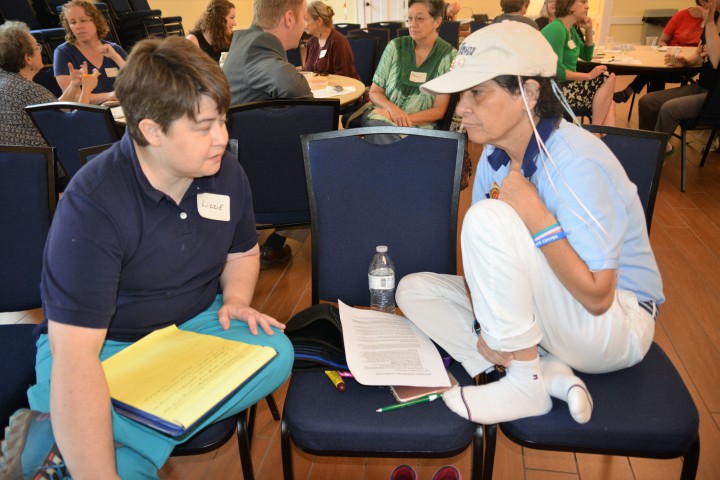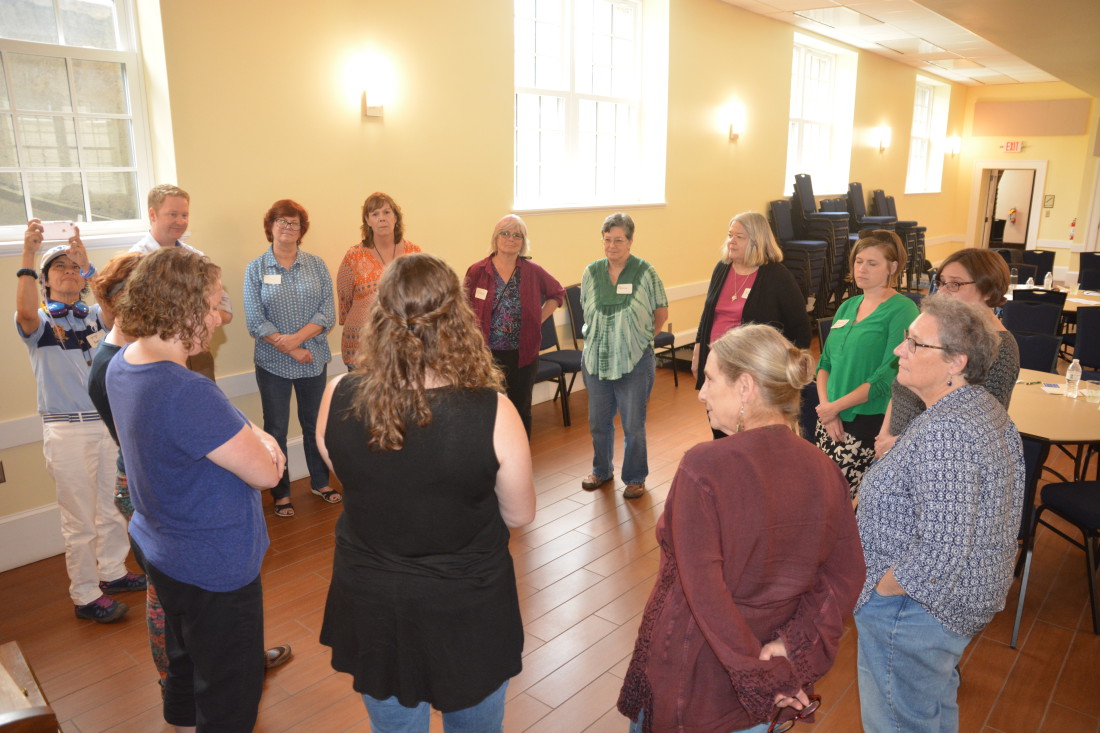When Rich Lee heard about the stabbing of three men who tried to intervene in the harassment of a young Muslim woman and her friend on a train in Portland, Ore., in May, he wondered whether there might be a safer way to advocate for people who are being bullied.
“Two of those three men died,” Lee said. “I wondered what I would have done in that situation and whether there might have been a better way to intervene.”
That musing led to a workshop on July 30, attended by about 50 people who wanted answers to the same questions Lee was asking.
His research turned up bystander intervention training offered by Ready the Ground in Durham. The three-hour class is intended to help people understand situations where intervention is appropriate and to help them decide how to intervene. The group keeps a low profile on the internet because of threats, but can be contacted via its Facebook page, www.facebook.com/readytheground.
Lee, a candidate for Asheville City Council, said he wondered how he would react if someone were threatening an innocent person in public, and it occurred to him that he might get killed defending someone.
“There’s no doubt that hate speakers feel emboldened right now, and we need to be able to deal with that in a safe way,” he said.
Asheville real estate agent Alan Rosenthal attended because he wanted to arm himself with information.
“We live in an interesting time,” Rosenthal said. “People aren’t working hand in hand anymore, and I want to find ways to encourage us to do so.”
Laurie Johnson of Fairview said she tends to jump into situations that could be dangerous, and she wants to be more aware of the proper way to intervene when she sees trouble.
“I still want to jump in, but I want to do so with less risk,” she said.
The workshop helped participants from across North Carolina and eastern Tennessee understand when and how to help people who are being attacked or bullied.
Maju Rajendran, who with Catherine Berman facilitated the workshop, told participants that intervention is not something best done alone, but that people who intervene should seek partners, both to be safer and to work with someone who might complement one’s own strengths.
“This is about a shift toward the idea that we’re all in this together, which is a bit radical in this society right now,” she said. “We want to do this because it is not OK for us to be OK with the status quo right now.”
If you hope to intervene in a troublesome situation, it’s important to know your motives, your strengths and your weaknesses, Rajendran said.
Consider how you react to trouble — fighting, fleeing or appeasing — and, based on those reactions, how you can best center yourself in various situations. If you know these things about yourself and your reactions, you’re more likely to choose the proper role and be effective. For example, if you’re someone who reacts with anger, it might be better for you to allow someone else to address the perpetrator directly while you work to calm people nearby or call for more help.

Twins Christel and Ruby Schober Colburn, 12, said they came because they want to be able to help people in trouble. They learned they can work as a team to help keep each other calm, and since most incidents of bullying happen in schools and on college campuses, they figure they’re as likely to encounter it as anyone.
Berman advised participants to assess the situation to be sure it meets the definition of “trouble,” in that it interferes with someone’s safe passage or sends a message of threat or hostility, and to intervene in ways that help the targeted person or people feel empowered to speak for themselves.
Try to stay positive and keep a welcoming attitude toward other witnesses and thank them if they assist in any way.
Maintain a calm voice and do not threaten or use violence. Always make sure the person you’re trying to calm has an escape route.
Intervention can be as simple as beginning a conversation with a perpetrator and walking with that person in an effort to distract and defuse.
Practice active listening, repeating the person’s points to them: “I understand you want …” “I see you’re really upset …” Once the person realizes you’re listening, he or she may feel less frustrated.
Remember that your body language can speak as clearly as your words. Your hands should be unclenched, palms up, your head slightly tilted. Never point or shake a finger, and never touch someone you haven’t met before. Keep your voice low and calm.
Asked to provide a law enforcement perspective on citizen interventions in tense situations, Asheville Police Chief Tammy Hooper says she welcomes inquiries from organizations and groups interested in serving the community in this role. “Typically these organizations coordinate with law enforcement agencies in order to be effective when responding to a scene,” Hooper says.
Coordination is crucial so that “law enforcement are aware of the organization and their purpose/goal in providing on-scene response,” Hooper continues. The Police Department also provides training about where bystanders can be on a scene, “since preservation of a crime scene is of the utmost importance.”
Hooper didn’t speak to how individuals should respond to situations they encounter during the course of daily life. “We encourage any organization, or team, wishing to provide crisis response to reach out to the Asheville Police Department so that we can work together to coordinate and clearly define expectations,” she says.
Rosenthal said he left the training feeling more capable of stepping in when he witnesses trouble.
“I see myself as someone who will step in,” he said. “Now I see myself as someone in a larger community of people willing to do the same.”



Before you comment
The comments section is here to provide a platform for civil dialogue on the issues we face together as a local community. Xpress is committed to offering this platform for all voices, but when the tone of the discussion gets nasty or strays off topic, we believe many people choose not to participate. Xpress editors are determined to moderate comments to ensure a constructive interchange is maintained. All comments judged not to be in keeping with the spirit of civil discourse will be removed and repeat violators will be banned. See here for our terms of service. Thank you for being part of this effort to promote respectful discussion.